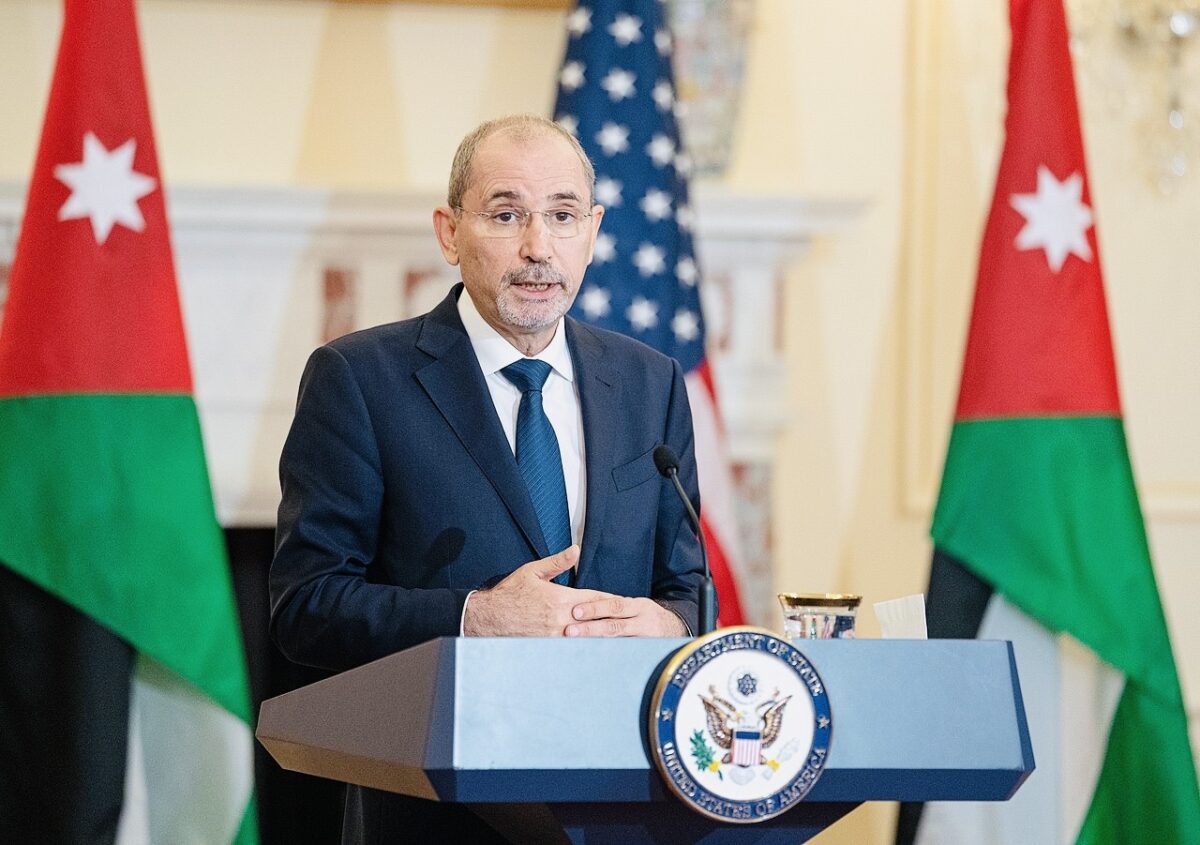As Iranian missiles and drones hurtled toward Israel on April 13 during Iran’s direct and unprecedented attack, a coalition of nations united in a show of force to intercept 99 percent of the incoming projectiles. They were shot down by Israel, the United States, Britain and Jordan in a coordinated effort that must have infuriated Iran, Israel’s deadliest enemy.
The military intervention stymied Iran’s attempt to exact full vengeance on Israel for its April 1 bombing of its consulate in Damascus. This precise and devastating air raid claimed the lives of three Islamic Revolutionary Guards Corps generals and four of its officers, all of whom were directly involved in the funding and arming of Iranian proxies ranged against Israel.
Apart from Iran’s decision to strike Israel from its own territory, the most remarkable development on that fateful day was Jordan’s participation in thwarting the Iranian onslaught.
With Iranian drones and missiles streaking toward Israel, Jordan, a U.S. ally, closed its airspace as a precautionary measure and the Jordanian Air Force reportedly shot down dozens of Iranian drones. As well, the Jordanian government apparently allowed Israeli aircraft to fly into Jordan to deal with the projectiles. On April 14, Jordan confirmed that it had intercepted “flying objects” crossing its airspace, but offered few details.
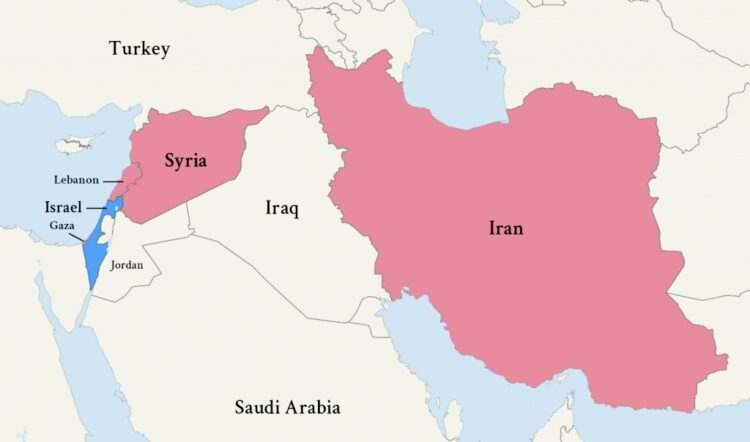
Israel was grateful for Jordan’s assistance, though Israel’s layered missile defence system probably could have destroyed nearly all of the drones and missiles.
Although the United States, Israel’s chief ally, presumably pressured Jordan to help Israel, Jordan, which has fought three wars with Israel since 1948, may well have had an ulterior motive to intervene: to repay an old debt to Israel.
In 1970, the Israeli armed forces played a key role in turning back a Syrian invasion of Jordan. Amid the turbulent events of Black September, during which Palestinian hijackers forced three foreign commercial airliners to land in Jordan, Syria invaded Jordan to assist Palestinian armed groups to depose King Hussein, the reigning monarch, and to seize control of Jordan, which shares a long border with Israel.
The crisis in Jordan mushroomed into an international conflict following the Syrian invasion on September 19, 1970. Syrian troops, disguised as soldiers of the Palestine Liberation Army, penetrated the border and joined Palestinian fighters in attacks on the Jordanian army.
Condeming Syria, the United States called for the “immediate withdrawal of Syrian forces” from Jordan.
Ignoring the U.S. demand, Syria captured the northern cities of Irbid and Ramtha and threatened King Hussein’s authority in Amman. Facing defeat, he issued an appeal for U.S. assistance. In a message to U.S. President Richard Nixon on September 21, he wrote, “Situation deteriorating dangerously following Syrian massive invasion … I request immediate physical intervention both air and land. Immediate air strikes on invading forces from any quarter are imperative.”
The Syrian occupation of Jordan left Nixon with few options since Syria was a client state of the Soviet Union, the United States super-power rival. Nixon and his national security advisor, Henry Kissinger, believed that Israel could constrain Syria.
Kissinger asked the Israeli ambassador in Washington, Yitzhak Rabin, whether Israel could intervene militarily. Israel agreed to save Jordan from its predicament, sending reinforcements to the border and fighter aircraft to the skies in a bid to deter Syria.
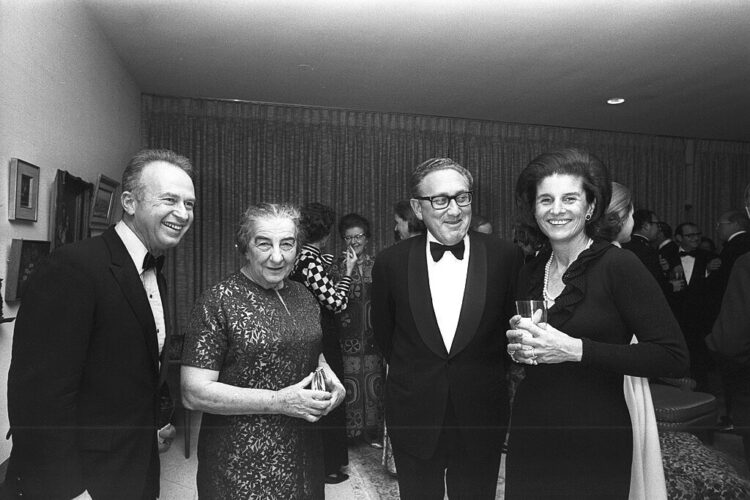
The Syrian regime got the message, promptly withdrawing from Jordan and allowing the Jordanian army to destroy the Palestinian state-within-a state in its territory.
Jordan was grateful for Israel’s intervention, and from that point forward the United States regarded Israel as a strategic ally.
Fifty four years on, Jordan reciprocated, despite its currently cool relationship with Israel. In the months leading up to the April 13 incident, Israel and Jordan — the second Arab state after Egypt to sign a peace treaty with Israel — were greatly at odds over the current war in Gaza.
On November 1, Jordan recalled its ambassador in Tel Aviv, Rasan al-Majali, to protest Israel’s conduct of the war and the “humanitarian catastrophe” in Gaza.
At the same time, Jordan informed Israel’s foreign ministry that the Israeli ambassador in Amman, Rogel Rachman, who had been temporarily called back to Israel due to threats directed against the embassy, should not return to his post until further notice.
The Jordanian foreign minister, Ayman al-Safadi, said that Jordan would not normalize relations with Israel until the cessation of hostilities between Israel and Hamas. He also said that Israel’s offensive in Gaza was creating hatred toward Israel among Jordanians and endangering Jordan’s peace treaty with Israel.
Prior to these chain of events, Jordan, which has a large Palestinian population, called for an immediate ceasefire. Meanwhile, the Jordanian prime minister, Bisher Khasawneh, warned Israel that the displacement of Palestinians from Gaza would be regarded as a “declaration of war” by Jordan’s government and its king, Abdullah II.
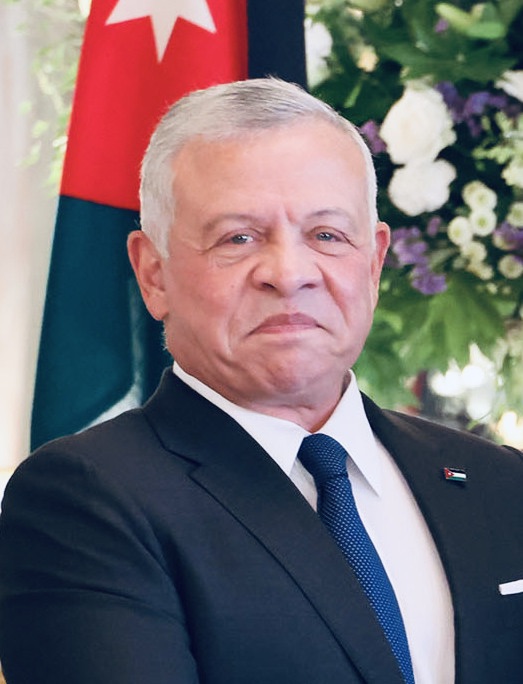
During this tense period, Jordan announced it would not sign an agreement to provide energy to Israel in exchange for water.
Long before the eruption of the current war in Gaza, Israel’s bilateral ties with Jordan had soured.
Jordan is an advocate of a negotiated two-state solution, but the current Israeli government opposes Palestinian statehood. Jordan, the custodian of the Temple Mount complex in Jerusalem, has expressed concerns that Israel has been trying to change the status quo there, an accusation that the Israeli government denies.
Last year, shortly after his inauguration as prime minister, Benjamin Netanyahu visited Jordan and met King Abdullah to review Israel-Jordan relations, which have deteriorated during Netanyahu’s premiership.
So much so that Jordan has declined membership in the Negev Forum, an Israeli diplomatic initiative that encourages regional integration, cooperation and development. While the United States, Egypt, Bahrain, Morocco and the United Arab Emirates have participated, Jordan has boycotted it on the grounds that the Palestinian issue has not been properly addressed.
Last month, as the war in Gaza raged, anti-Israel protests broke out in front of Israel’s embassy in Amman. They were organized by groups affiliated with the Muslim Brotherhood, workers’ unions and professional organizations representing engineers, doctors, and lawyers aligned with the Muslim Brotherhood.
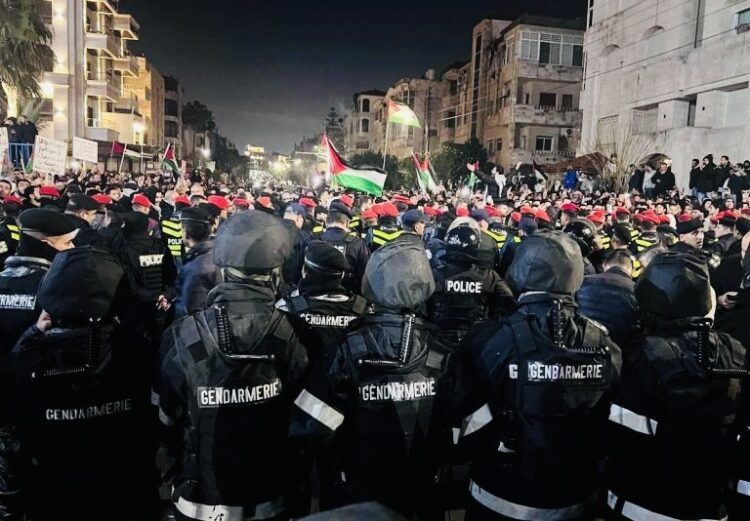
Waving Palestinian flags, the demonstrators shouted chants in support of Hamas, lambasted Palestinian Authority President Mahmoud Abbas as a “dirty traitor,” and called for the annulment of Jordan’s peace treaty with Israel and the cancellation of all aspects of normalization with its Israeli neighbor.
Despite the deep anti-Israel strain in Jordanian public opinion, Jordan stepped up on April 13 to blunt Iran’s drone and missile barrage.
Safadi, the first Jordanian official to publicly confirm that Amman had assisted Israel, framed Jordan’s response as a defence of its sovereignty and territorial integrity rather than a helping hand to Israel.
As he put it, “Whatever objects that go into our skies, violate our airspace, that we believe pose a danger to Jordan, we will do whatever within our means to end that threat and that’s what we did. Our priority is to protect Jordan and Jordanian citizens.”
“What happened was a sign of how dangerous the situation can deteriorate unless we deal with the cause of all this tension, which is the Israeli aggression in Gaza and the continued absence of a political horizon,” he added in a reference to a two-state solution.
Safadi said that no one should be allowed “to jeopardize the security of Jordan and Jordanians.”
King Abdullah’s palace also issued a statement: “His Majesty affirmed that Jordan will not allow a regional war to unfold on its land.” The communique neither mentioned Iran nor Jordan’s role in the interception of Iran’s projectiles. Instead, the king addressed “the latest developments in the region and efforts to deescalate and reach a ceasefire in Gaza.”
The communications minister, Muhannad Mubaideen, placed Jordan’s response in a pan-Arab framework: “We are not abandoning our Arab and Islamic tasks and roles. Jordan’s positions are honorable and its Hashemite leadership has been defending the Palestinian cause for more than a century.”
In spite of this rationale, dissenting voices decrying Jordan’s participation in the counter-attack against Iran emerged on social media.
A blogger, in an audacious rebuke to the Jordanian government, posted a mock photograph of King Abdullah in an Israeli army uniform.

On the X platform, another blogger commented, “The Jordanian king dropped missiles on his citizens to protect Israel.” These accusatory words were posted next to a photograph of Iranian drone wreckage in the city of Karak, which is near the Israeli border.
Rebutting these claims, Jordan’s former foreign minister, Marwan Muasher, said that Jordan had acted in its strategic self-interest to “prevent an escalation” of Israel’s conflict with Iran. A regional war pitting Israel against Iran would likely harm the vital interests of the Hashemite kingdom, which is squeezed between the two warring nations.

During Iran’s attack, the semi-official Fars News Agency, citing an “informed source” in the Iranian armed forces, warned Jordan that Iran was “carefully monitoring (its) movements, and that if Jordan intervened it could well be Iran’s “next target.”
Displeased with Iran’s apparent threat, the Jordanian foreign ministry on April 14 summoned the Iranian ambassador in Amman for a reprimand.
By that point, Jordanian tensions with Iran were already at an elevated level. Kataib Hezbollah, an Iranian-backed militia in Iraq, had threatened to send 12,000 heavily-armed fighters to Jordan to fight Israel.
This was not music to Jordan’s ears. Jordan would most certainly oppose the presence of an Iranian proxy operating on its soil, weakening its control over its sovereignty, and inviting probable reprisals from Israel.
A few months ago, an Iranian surrogate organization in Iraq fired drones at a remote U.S. base in northeast Jordan, killing three soldiers, injuring more than 30, and triggering an American retaliatory strike.
Back in 2004, Jordan warned that a “Shi’a crescent” in the Middle East was emerging and that Iran would expand its influence over neighbors such as Iraq, Syria and Lebanon. In the same year, Jordan’s embassy in Baghdad was bombed, resulting in the deaths of nine people.
Jordan is obviously in a delicate place with respect to Israel’s ongoing conflict with Iran. But it has no intention of siding with Iran, a position that would bring it into a confrontation with Israel and the United States.
